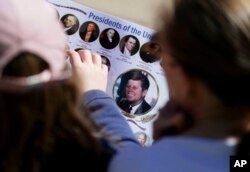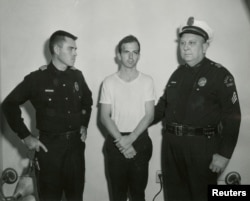Hours before a legal deadline for the release of all documents relating to President John F. Kennedy's assassination, President Donald Trump ordered Thursday that hundreds of the files would remain secret, at least temporarily.
A day after tweeting that the "long anticipated release of the #JFK files" was near, Trump issued a memo to federal agency heads saying, "I am ordering today that the veil finally be lifted."
At the same time, he wrote that he "had no choice today [but] to accept redactions" recommended by some departments in the interest of national security.
A White House official said most of the recommendations had come from two agencies, the FBI and the CIA.
The files were released Thursday, shortly after 8 p.m. EDT (0000 UTC Friday).
National Archives
Officials briefing reporters Wednesday said 2,800 records would be released by the National Archives beginning immediately. They said Trump had given agencies requesting that files be withheld 180 days to justify why those files should not be released as well.
"At the end of that period," the president wrote, "I will order public disclosure of any information that the agencies cannot demonstrate meets the statutory standard for continued postponement of disclosure" under the President John F. Kennedy Assassination Records Collection Act of 1992.
Trump said temporarily "withholding from public disclosure" the remaining documents was "necessary to protect against harm to the military defense, intelligence operations, law enforcement or the conduct of foreign relations that is of such gravity that it outweighs the public interest in immediate disclosure."
Much of the scholarly interest in the assassination papers focuses on files concerning a visit by Kennedy's assassin, Lee Harvey Oswald, to Mexico two months before the president's visit to Dallas on November 22, 1963.
A White House official briefing reporters Wednesday refused to be drawn into the issue when asked about the Mexico City files.
Another official, who under briefing rules could not be identified, suggested that Trump was dissatisfied with having to withhold documents after indicating in his Twitter feed that all files might be released. "The president wants agencies to do a better job in getting the information out as quickly as possible," the official said.
Controversy and conspiracy theories sprang up within days of the assassination. Less than a week after Kennedy's death, President Lyndon B. Johnson appointed Supreme Court Chief Justice Earl Warren to conduct an independent inquiry.
10-month investigation
After a 10-month investigation, the Warren Commission issued an 888-page report concluding that Oswald had acted alone to kill Kennedy, and that local nightclub owner Jack Ruby also had acted alone in killing Oswald while the assassin was in police custody two days later.
The vast majority of documents relating to the assassination have been in the public domain for decades.
The files released Thursday included more than 5 million pages of records that were withheld under the JFK Records Act, some for national security reasons and others because they were deemed irrelevant to the investigation.
U.S. District Judge John Tunheim headed the congressionally mandated independent Assassination Records Review Board that went through all assassination files in the 1990s and decided which ones should be held back until now.
In a VOA interview, Tunheim said he's confident that with very few exceptions, everything relevant to the investigation was made public long ago.
"The review board was very careful in its work to make sure that anything about the assassination itself or about Oswald or about Ruby or any of the characters involved in the assassination was released," Tunheim told VOA. "If it was central to the story, we released it. There's no question about it."
Release of the final batch of files was unlikely, however, to satisfy the legion of conspiracy theorists that has grown up around Kennedy's death.
Conspiracy theories
A 2013 Gallup Poll showed that a solid majority of Americans thought others besides Oswald were involved in the assassination.
Many of the conspiracy theories surround the visit by Oswald, a 24-year-old former Marine who had spent years in the Soviet Union, to Mexico City two months before the assassination, when he visited the Soviet and Cuban embassies.
Larry Sabato, director of the University of Virginia Center for Politics and author of a book about Kennedy, said he was no conspiracy theorist. But he was most interested in documents pertaining to the Mexico City visit.
Sabato has assembled a staff of researchers to go through the files, but he said the job of finding any gems that might be hidden in the mass of newly released material would take a long time.
"There are hundreds of thousands of pages in these 3,100 files," Sabato told VOA. "It's going to take us years to get through all this and to be able to analyze it."
Tunheim, who is currently chief judge of the U.S. District Court for Minnesota, said it was important that the public know absolutely everything about the assassination was out in the open.
"The message should be clear to the American people that everything is being released, and there really is nothing left to release, even if it might incidentally reveal some long ago intelligence gathering methods," he said.







